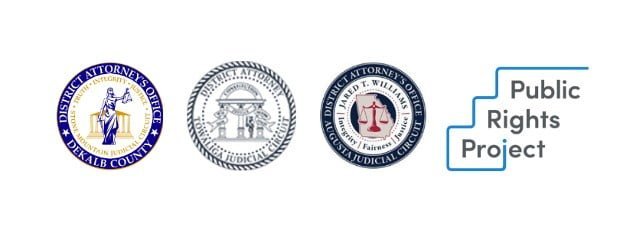Georgia District Attorneys Challenge Constitutionality of Oversight Commission

A bipartisan group of Georgia district attorneys (DAs) filed a lawsuit today in Fulton County Superior Court, contesting the constitutionality of the Prosecuting Attorneys Qualifications Commission (PAQC). The PAQC, established with the authority to investigate and remove local prosecutors, has faced scrutiny over its oversight process.
The PAQC, whose members were appointed by Governor Brian Kemp and other Republican officials, has been accused by the plaintiffs of seeking to limit the power of elected prosecutors and override the will of voters.
Last year, the Georgia Supreme Court declined to approve the commission’s rules, citing constitutional concerns. However, on March 13, 2024, Governor Kemp signed a new bill (SB 332) into law, effectively reinstating the PAQC by removing the Supreme Court’s oversight.
Led by Stone Mountain Judicial Circuit District Attorney Sherry Boston (D), the plaintiffs include both Democratic and Republican DAs, such as Towaliga Judicial Circuit District Attorney Jonathan Adams (R) and Augusta Judicial Circuit District Attorney Jared Williams (D). They are represented by the Public Rights Project, a national nonprofit focused on civil rights, along with Atlanta-based law firms.
“Our commitment to fight this unconstitutional law is as strong as ever. Gov. Kemp and the state lawmakers who supported this measure willfully ignored the concerns raised by the Georgia Supreme Court and did the absolute minimum to force the PAQC into existence. As I promised in November, we will continue to push back against this shameless attempt by state Republicans to control how local communities address their public safety needs and work to restore that power to Georgia voters,” said DA Sherry Boston.
“The lawsuit marks a crucial step in fighting back against a growing national trend of states threatening the independence of local DAs,” said Public Rights Project Legal Director Josh Rosenthal. “Georgia communities elect DAs to pursue the solutions that will keep them safe and promote justice, and this new commission aims to take that power away. We’re proud to fight alongside DAs Boston, Adams, and Williams.”
The lawsuit contends that the PAQC disrupts the fundamental structure of Georgia’s constitution, which grants local communities the authority to elect their own district attorneys. Additionally, it highlights that DAs removed by the commission are barred from serving again for 10 years.
Impact of the PAQC on Local Prosecutors
The PAQC threatens the ability of local district attorneys and solicitors-general to create policies that use a full range of tools—beyond incarceration—to promote public safety in their communities. To be effective, DAs must find ways to leverage their limited resources to focus on the most serious of crimes and use programs like pretrial diversion to resolve other cases more efficiently.
Under the new law, however, the PAQC is empowered to discipline DAs based on their stated philosophies and commitments. For instance, DAs could be subject to discipline or lose their jobs for committing not to prosecute adultery, which is a crime under Georgia state law.
That restricts the First Amendment free-speech rights of DAs as candidates and officials by creating a chilling effect on their ability to openly communicate their prosecutorial priorities to the public for fear of a PAQC investigation based solely on philosophical differences.
“This law is not about oversight, it’s about overturning the will of voters,” said DA Jared Williams. “It creates a dangerous barrier between public officials and the communities we serve, discouraging transparency and undermining our freedom of speech.”
Unlawfulness of New Commission
The lawsuit alleges that the PAQC violates Georgia law, the Constitution of the State of Georgia, and the U.S. Constitution in three ways:
- Separation of powers (interference with prosecutorial discretion). The General Assembly does not have the authority to direct or undermine district attorneys’ exercise of prosecutorial discretion.
- Free speech under the federal and state constitutions. The law restricts the First Amendment free-speech rights of DAs as candidates and officials, punishing DAs for articulating their prosecutorial philosophies and for being clear with their communities about how they will carry out justice.
- Failure to Obtain the Assistance of the Prosecuting Attorneys’ Council: O.C.G.A §15-18-32(g) requires the PAQC to consult with the Prosecuting Attorneys’ Council (PAC), Georgia’s official, objective agency to assist prosecutors, as it developed the Code of Conduct and other rules. Instead, the partisan members of the commission plowed forward with rules that reinforce the statute’s flaws without consulting PAC.
The plaintiffs have asked the court to declare that O.C.G.A. § 15-18-32 is void or to at least halt the PAQC from handling any complaints or disciplining any local prosecutors.
With the filing of the lawsuit, the plaintiff DAs also seek to bar the new commission from investigating or taking disciplinary action against district attorneys or solicitors-general for prosecutorial decisions, including non-prosecution policies, or for statements related to those decisions.






